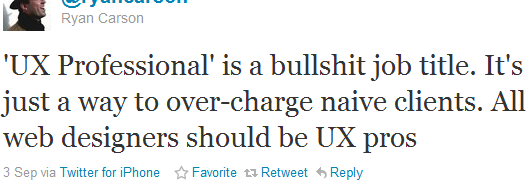The web is a big, messy thing. It’s complicated. There are many facets to the web, involving technologies, crafts and skills. Hardly surprising then that to make something wonderful on the web, you may need the help of specialists. You wouldn’t expect to build a house without the help of specialists, and you certainly wouldn’t expect an architect to carry a hod, or a roofer to plumb the toilets, or the builder to plan the wiring.
The need for web industry specialists seems obvious to me, but there is scepticism about some of the professionals helping to make better web experiences that work for both users and the organisations behind them. Let’s look at some of the sceptical remarks that have surfaced recently:
The sceptics view of web industry specialists…
…urm, actually, it’s impossible to quote the rambles of Olivier Blanchard, but you can gauge his ire by scanning his inflammatory but ultimately hollow blog post in which he rails against the current trend for content strategy.
And Ryan Carson tweeted his scepticism for user-experience designers:
But why should web designers stop at UX expertise? Surely they should also take on copywriting, usability testing, market research and cross-stitch too.
I’ve worked on web projects with dedicated UX people and seen those UX people carry out a range of functions that are quite different from web design – things like research, user tests and creating personas – things that warrant a specialist. Sure, a good web designer should take an interest in related fields like user experience design, information architecture and usability, but to expect every individual to become experts in so many broad areas is somewhat delusional. Should we all be the Jack of all trades, and master of none?
Content strategy – not snake oil
As more people talk about content strategy, there will be doubters. To some, content strategy is just a faddish name for things we’ve always been doing. And yes, while content strategy doesn’t bring many revelations to the web, it does package up a way of thinking about the challenges of web content. Content strategy isn’t about creating jobs or complicating web projects – it’s about bringing clarity to the often murky world of content, and helping businesses derive value from their content.
Content strategy isn’t for lone bloggers, just as you don’t need an architect to erect your shed. But content strategy does make sense when you’re wrangling hundreds or thousands of pages of content and a raft of business goals.
In closing…
I love the idea of simplifying the web. If the creation of great websites could be simplified, reduced to a formula, or a series of strokes on a keypad that unfurled a mesmerising website that met every objective and satisfied every faction of its audience – I’d be thrilled. But the reality is that building big and complicated web entities requires the skills of specialists.



Hey Leif,
I agree with your overall point about the value of specialisation.
However, I can relate to the frustration of seeing people concoct roles to bamboozle clients and inflate rates.
Clearly, content strategy and UX design are the hot new faces in town right now. But, much like SEO, the vagueness and newness of both roles will attract shysters keen to exploit the faint shroud of mystery around both. Hopefully, time will weed out the bull**itters, of course.
Nice post mate. I’m off to buy a fresh cream eggless cake.
Comment by Paul @Scribblemill — October 7, 2010 @ 2:55 pm
Hey Paul – thanks for stopping by. I know what you mean about the shysters, but I don’t think many of the vague bullshit*ers will bother pretending to do content strategy, because it’s actually kind of boring. It’s not frivolous or fun like being a Social Media Consultant, which basically involves spending lots of time on Twitter.
Content audits are not very sexy, nor is sitting in dark rooms asking users to touch buttons (unless…) so I don’t think these are disciplines created for fun, or to extract cash from clients. But we shall see!
Comment by Leif Kendall — October 7, 2010 @ 4:19 pm
Hey Leif, interesting post – and the Blanchard argument seems a bit facile to me too. Editors and writers are terms originating in print. And if editorial strategy is a long accepted concept from there, why shouldn’t content strategy be just as valid in a web space?
The net is opening ever greater possibilities for organisations, but the principle of ‘content is king’ (I believe) doesn’t change. No website, however well built or designed, will succeed if the content is not right. That needs a strategy, which in itself brings in a whole range of specialisms.
Paul is right about the void potentially attracting bullsh&tters, but that definitely doesn’t undermine the work.
I think one of the hard things is that, while you typically can’t launch a website without build or design, it is possible to launch one without a content strategy or UX work. It’ll probably just be rubbish that’s all.
Comment by Paul — October 7, 2010 @ 7:26 pm
[…] This post was mentioned on Twitter by Leif Kendall, Clinton Forry. Clinton Forry said: "…it’s about bringing clarity to the often murky world of content…" http://j.mp/atPt3A #contentstrategy […]
Pingback by Tweets that mention In defence of web industry specialisms… | Freelance Copywriter | Web / SEO Copywriter | Brighton/London -- Topsy.com — October 8, 2010 @ 9:36 pm
Where I work they are busy getting rid of specialisms and specialists in favour of a team of web developers with identical job descriptions, which include everything.
.net application development with c#
HTML/css
Javascript
SEO
Usability/ IA
Accessibility
Graphic design
the list goes on
No one person can be an expert in all those things. They will end up with a team that can do those things ok, but not brilliantly; or alternatively (and more likely) will do the things they already know, and the rest will fall by the wayside. It all seems doomed to me – so I am thinking seriously about moving into freelancing – and your freelancing guide is damn useful! Cheers!
Comment by Joe — January 1, 2011 @ 9:17 am
Hi Joe,
Glad you found the guide useful. I’ve written a book on the subject too! Brilliant Freelancer isn’t published until May 2011, but you can sign up for a nudge when it comes out here: http://brilliantfreelancer.com
Good luck!
Comment by Leif Kendall — January 1, 2011 @ 11:52 am